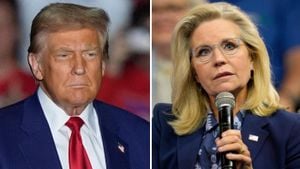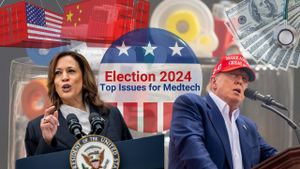Former President Donald Trump has once again demonstrated his stronghold over Iowa, winning the state decisively for the third consecutive presidential election. This victory was anticipated by many political analysts, marking yet another demonstration of Trump’s enduring popularity among Republican voters. The Associated Press called the race shortly after 9:40 p.m., with the count showing Trump leading at 56% compared to Vice President Kamala Harris’s 43%.
Iowa, long seen as a competitive swing state, has become increasingly Republican-friendly, especially after Trump won it by significant margins during the last two elections. Iowans had initially supported Barack Obama decisively during his campaigns, but after shifts toward Trump, the electorate clearly aligned with him. The state carries six precious Electoral College votes, contributing to the complex math candidates must navigate to reach the 270-electoral-vote mark required for the presidency.
Trump's success went beyond just him; his party also recorded victories across various state and legislative seats. Republican chair Jeff Kaufmann gleefully proclaimed after the race was called, “If you thought there would be no issues, you’d be wrong.” His statement highlighted the general trend of Republican success, which included winning three out of four congressional seats, though the final race was still too close to call.
On the flip side, Harris was challenged by the recent poll by the Des Moines Register/Mediacom showing her with a slight lead just days before the election, leading many observers to ponder whether her nomination, following Biden's withdrawal from the race, would invigorate Democratic voters. This poll indicated Harris at 47% and Trump at 44%, raising the stakes and expectations for the Democratic campaign. Independent women and older female voters reflected larger support for Harris, yet voters remained uncertain about the outcome.
Trump’s campaign, characterized by energetic rallies and individual engagements, seemed unperturbed by the polling data. His supporters had confidence, particularly following his dominating performance at the Iowa GOP caucuses earlier this year, where he bested several challengers like Florida Governor Ron DeSantis and former U.N. Ambassador Nikki Haley with ease.
Despite uncertainties leading up to the election, many Iowans felt compelled to rally behind Trump. Voters expressed satisfaction with his previous term, citing improvements made during his presidency, particularly related to economic conditions prior to the COVID-19 pandemic. For example, Vicky Scott, 73, who declared, “I wanted to return to Trump’s tenure,” emphasized the approval of Trump’s policy initiatives during his first term. Some supporters, toggling between uncertainty and affinity, pushed back against the initial lead Harris seemed to have achieved through late polling.
Conversely, there was noticeable discontent among Democratic voters, particularly those who felt disenfranchised by the party's performance and direction, including some who had formally supported candidates like Biden. Scott Thompson illustrated this divide when he stated, “I used to be Republican, but now I fear democracy is slipping away,” raising concerns over Trump's potential reelection and his past stances.
The event where Democrats gathered to follow the election night results highlighted the palpable anxiety about the campaign. Even as some Democratic supporters shared food and camaraderie, the atmosphere shifted from excitement to disappointment as election results poured in, reflecting the Democratic struggles to energize their voter base amid Harris's nomination and Trump’s looming shadow over Iowa.
Trump’s campaign benefits from four years of incumbency and statewide familiarity. Coupled with the confusion surrounding Biden’s recent departure from the race, the energy among Republicans far outweighed the enthusiasm felt by Democratic supporters. Iowa GOP leaders cited their party's strong voter registration numbers and boost among mail-in ballots as pivotal reasons for their outlook leading up to the election result.
The reliability of polling data came under fire from state Republicans who criticized the Des Moines Register's recent polling for incorrectly predicting election outcomes. This prompted Kaufmann to shout triumphantly, “Ann Selzer’s wrong! The Des Moines Register’s wrong! Donald Trump just won Iowa!” His sentiments indicated GOP optimism as polls leading up to the election suggested Harris might close the gap.
Kamala Harris’s ascendance, following Biden’s withdrawal, was seen by many as presenting new opportunities for the Democratic ticket, especially among previously unregistered voters. Harris gained wide support through several initiatives addressing modern social issues, including climate change, immigration reform, and ethnic diversity. That said, it remained unclear if her campaign could convert support from her status as the first female vice president and racial diversity to tangible electoral wins.
Interestingly, Harris's strategy revolved around appealing to younger voters and independent voters, particularly suburban women, who had largely favored Trump’s economic messaging over more progressive democratic platforms. While some Iowans expressed their desire for change, they remained cautious, reflecting on past policy effectiveness and questioning how Harris could implement substantive changes without the previous support systems established during the Obama administration. Yet, as results came through, the uncertainty surrounding Democratic strategies became more pronounced as their efforts fell short against Trump’s reestablished stronghold.
With the election results published, attention is now shifting to the upcoming battleground states, where both candidates will aim to capture voter sentiment and momentum. Candidates including Trump, Harris, with their respective campaigns face immense pressure to clarify their platforms and appeal persuasively to voters over the coming months.
Trump's win signifies not just his ability to claim Iowa yet again but also sets the tone for what could potentially shape the contours of the 2024 presidential campaign. The dynamics of swing state politics, particularly concerning grass-roots mobilization and voter engagement, will now play increasingly pivotal roles as both parties attempt to galvanize their support base and win over skeptics leading to the final countdown to the election. Trump's loyal following ensured another victory here, but challenges remain for both major parties as they progress beyond Iowa.



